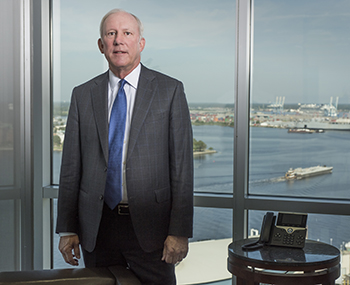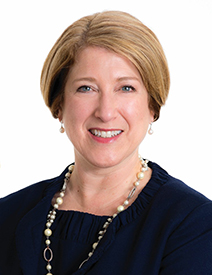Law and disorder
Pandemic brings wave of cuts, new cases to law firms
Law and disorder
Pandemic brings wave of cuts, new cases to law firms
The coronavirus pandemic shutdowns led some Virginia law firms to furlough employees and cut pay. Will an onslaught of COVID-19-related litigation be enough to prevent another wave of cutbacks?
Bill Van Buren, president and chairman of Norfolk-based Kaufman & Canoles PC, estimates that staffing levels at law firms throughout the country “are down 10% to 20%” because of pandemic-related cost cuts.
At Kaufman & Canoles, “We haven’t laid anyone off,” Van Buren says, but in the early stages of the economic crisis, the firm initially furloughed approximately 10% of its roughly 100-person workforce throughout the state. After receiving a Paycheck Protection Program loan, the firm suspended the furlough, however.
Nearly half of the 100 largest U.S. law firms have taken steps to trim costs in response to the pandemic, according to a July 23 Bloomberg Law report. But “a handful of firms say their first-half business was better than expected, so they’re reversing or reducing some pay cuts,” according to Bloomberg.

Another national report from Law360 states that while “experts expect a second wave of crisis and layoffs in the fall, firms may move the cuts up the ladder, targeting the senior lawyers who do not have an ownership stake in the firm.”
The pandemic slowed the merger between Atlanta-based Troutman Sanders LLP and Philadelphia-based Pepper Hamilton LLP. And while the situation didn’t result in mandatory furloughs, 33 people in Troutman Sanders’ 250-person Richmond office took voluntary leave in May, says Brooks Smith, managing partner for the Richmond office of the merged Troutman Pepper, said. Almost all furloughed staff members were expected back at work by the end of August.
There also have been temporary salary reductions, tiered so that there was less impact on lower paying positions, Smith says. “The firm has done incredibly well during the pandemic, but legal is sometimes a lagging indicator, so it’s sound fiscal management,” he adds.
The merger of the two firms was pushed back from April to July 1, due to the pandemic. The combined 1,100-lawyer firm is based in Atlanta and has offices in Virginia Beach and Richmond.
The jury’s out
After the crisis began to impact her solo employment law practice, Virginia Beach-based attorney Lisa A. Bertini says, “I immediately furloughed my associate and receptionist. The receptionist resigned and the associate found a new job in D.C. where he wanted to be anyway.” The firm still has a paralegal and an office manager.
When the shutdowns began in mid-March, “it was unsettling for the first four to eight weeks. The phone got quieter. I was worried about [paying] rent and meeting payroll,” she says. Bertini handles employee discrimination and harassment lawsuits but, she says, “this was not the time to want to sue your employer.”
“I’m able to get calls, etc. I go to administrative hearings. I do fact finding. I meet with clients — with masks and social distancing,” she says. “It’s kept me busy, but I don’t know that I would have been able to keep an associate busy full time. I made the right decision.”
While some legal work has been able to continue, jury trials came to a halt when the lockdowns began. The Virginia Supreme Court issued a March 16 Declaration of Judicial Emergency stating that no jury trials could convene anywhere in the commonwealth. The order was extended until at least the end of August, except for four local circuit courts that received Virginia Supreme Court approval to restart jury trials: Alleghany, Henrico and Stafford counties and the city of Norfolk.
The Supreme Court put together a task force and asked each district court to submit a plan to resume jury trials. The plan must be approved by a panel of three justices in consultation with the Office of the Executive Secretary.
“Much of court’s business has moved forward. But there’s a backlog [and] there’s a concern about how the courts will manage the influx of work” after jury trials resume, says Monica T. Monday, managing partner of Roanoke-based Gentry Locke Attorneys, which also has offices in Richmond and Lynchburg.
Jonathan Harmon, chairman of McGuireWoods LLP in Richmond, sees the Virginia Supreme Court’s steps as positive but isn’t making any predictions about when jury trials will be back statewide. “We have a ton of litigators. Some of them say late fall, others say not till the first quarter [2021]. Civil litigation is moving slowly.”
Silver lining for law firms
As with any crisis, the coronavirus pandemic also presents opportunities, Monday says. Attorneys “are anticipating new litigation caused by the upheaval created by the pandemic.”
So much so that Torsten M. Kracht, a Washington, D.C.-based partner at Richmond-headquartered law firm Hunton Andrews Kurth LLP, is tracking the wave of COVID-19 litigation with a webpage featuring an interactive map and dashboard tracking coronavirus-related lawsuits around the nation. (www.huntonak.com/en/covid-19-tracker.html)
“It gets a very steady flow of hits every day” since its April launch, says Kracht. Since mid-August, he has identified about 4,300 separate coronavirus-related lawsuits, excluding bankruptcy filings.
“The biggest group of cases … are businesses suing insurers for denying business interruption coverage,” he says. There are also civil rights cases related to matters such as mandated business closures and “cases that are challenging different measures related to voting. I expect that category will heat up as we get closer to the election.”
There are also unlawful termination cases filed by employees who say they were wrongfully let go after complaining about COVID-19 policies, as well as consumer cases. “There are a lot of class actions against universities for failing to give refunds when they switched to online education,” Kracht says.
Harmon with McGuireWoods foresees a big increase in pandemic-related bankruptcy cases, especially in such hard-hit industries as travel, retail and health care. He also anticipates employment and labor lawsuits as well as class action litigation relating to the Coronavirus Aid, Relief, and Economic Security (CARES) Act.

“Unfortunately I think there’s going to be more claims against financial advisers, wealth managers,” he adds.
Monday predicts an uptick in white-collar criminal cases such as price gouging as a result of the pandemic. She also expects more higher education cases as universities and colleges try to bring students and employees back to campus.
Troutman Pepper set up a COVID-19 resource center that is generating business for its attorneys not only in litigation, but in tax, real estate, construction cybersecurity and government regulation, Smith says.
“We may well see COVID-specific but also COVID-related work across all practice,” he says. “I’m an environmental lawyer and I saw a lot of work at the beginning of the pandemic. People were bringing new products to market. We have a strong employment practice and those folks are very busy.”
Bertini has begun to see new employment cases, particularly related to the Americans with Disabilities Act. “Employers are worried about liability. They don’t want employees getting sick. They want to make a profit and pay people. Doctors, nurses, medical assistants feel they are really stuck. They are not provided with the same rights as nonmedical personnel under [the Family Medical Leave Act],” she says. “I don’t have answers for these people. There’s no precedent in this area.”
Adding to all the changes brought about by the pandemic, the General Assembly passed new laws this year that increased protections for LGBTQ people and expanded protections for employees who engage in certain whistleblowing activities.
“I think we’ll see more whistleblowers cases. That makes employers nervous,” Bertini says.
Technology to the rescue
Throughout the lockdown, technology — well-funded technology — has come to rescue of law firms.
McGuireWoods “spent a lot of money on technology. It’s been fairly seamless” making the transition to remote work, Harmon says. The firm had some logistical concerns, such as how to effectively cross-examine key witnesses during remote depositions, but “we’ve been surprised by how much we can do. We’re weathering the storm well. Once everything gets back, I think we’ve learned that we can do some of these things remotely.”
Troutman Pepper also “has a great system of technology,” Smith says. “We didn’t miss a beat going remote.” The system includes protected platforms that ensure that client information is not compromised, he adds.

And at Gentry Locke, “we saw our technology carry the day,” Monday says. “In mid-March, when everything hit, on a dime we made the decision to send almost everybody home.” She calls working remotely “a great involuntary experiment.”
The biggest challenge hasn’t been on the tech side, she says. “It’s the soft, interpersonal side. There’s forced isolation, reduced personal interaction. It’s hard for people to collaborate.”
To overcome any sense of isolation, Gentry Locke not only has regular remote business meetings, but younger associates are putting together remote social events, she says. Monday also began sending out a daily email as soon as they left the office. “It provides opportunities for remote training, for humor; it keeps people connected and informed,” she says. “It was daily; now it’s twice a week.”
Troutman Pepper works hard to make the newly merged firm feel like a big family. “We have Zoom calls and happy hours,” Smith says. “One associate who is a mixologist in San Francisco taught people how to [virtually] make classic drinks and we sent out kits to make the drinks. People take photos. We’re trying to stay connected.”
Not everyone appreciates the great involuntary experiment, however. “I hate it. It is definitely possible to help people remotely, but I miss the connection,” Bertini says.
Without face-to-face contact, she says, “I don’t know what kind of witness a person will make. How do I know I want to have a professional relationship with this person?”
Virginia Business Editor Richard Foster contributed to this story.
Subscribe to Virginia Business.
p




















